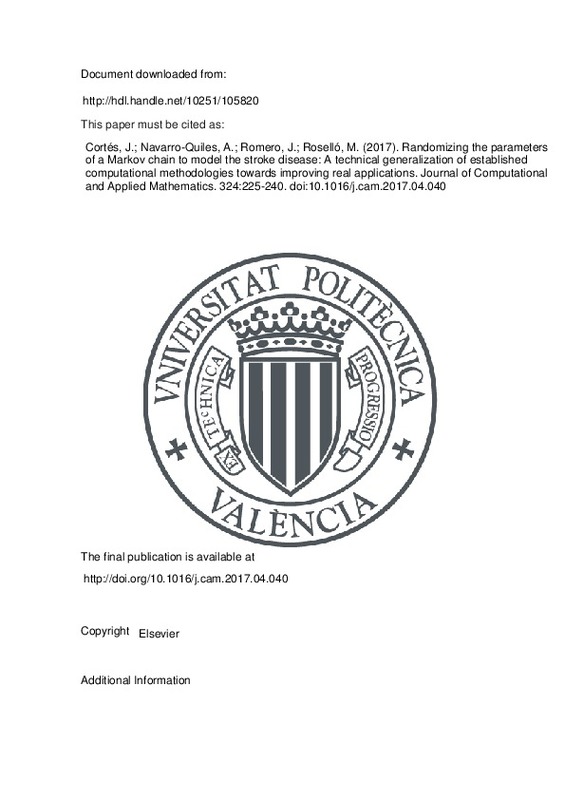JavaScript is disabled for your browser. Some features of this site may not work without it.
Buscar en RiuNet
Listar
Mi cuenta
Estadísticas
Ayuda RiuNet
Admin. UPV
Randomizing the parameters of a Markov chain to model the stroke disease: A technical generalization of established computational methodologies towards improving real applications
Mostrar el registro sencillo del ítem
Ficheros en el ítem
| dc.contributor.author | Cortés, J.-C.
|
es_ES |
| dc.contributor.author | Navarro-Quiles, A.
|
es_ES |
| dc.contributor.author | Romero, José-Vicente
|
es_ES |
| dc.contributor.author | Roselló, María-Dolores
|
es_ES |
| dc.date.accessioned | 2018-07-16T06:48:16Z | |
| dc.date.available | 2018-07-16T06:48:16Z | |
| dc.date.issued | 2017 | es_ES |
| dc.identifier.issn | 0377-0427 | es_ES |
| dc.identifier.uri | http://hdl.handle.net/10251/105820 | |
| dc.description.abstract | [EN] Classical Markov models are defined through a stochastic transition matrix, i.e., a matrix whose columns (or rows) are deterministic values representing transition probabilities. However, in practice these quantities could often not be known in a deterministic manner, therefore, it is more realistic to consider them as random variables. Following this approach, this paper is aimed to give a technical generalization of classical Markov methodology in order to improve modelling of stroke disease when dealing with real data. With this goal, we randomize the entries of the transition matrix of a Markov chain with three states (susceptible, reliant and deceased) that has been previously proposed to model the stroke disease. This randomization of the classical Markov model permits the computation of the first probability density function of the solution stochastic process taking advantage of the so-called Random Variable Transformation technique. Afterwards, punctual and probabilistic predictions are computed from the first probability density function. In addition, the probability density functions of the time instants until a certain proportion of the total population remains susceptible, reliant and deceased are also computed. The study is completed showing the usefulness of our computational approach to determine, from a probabilistic point of view, key quantities in medical decision making, such as the cost-effectiveness ratio. | es_ES |
| dc.description.sponsorship | This work has been partially supported by the Ministerio de Economia y Competitividad grant MTM2013-41765-P. Ana Navarro-Quiles acknowledges the doctorate scholarship granted by Programa de Ayudas de Investigacion y Desarrollo (PAID), Universitat Politecnica de Valencia. Authors would like to thank Prof. Dr. Javier Mar for providing them medical data about stroke disease from his research. | |
| dc.language | Inglés | es_ES |
| dc.publisher | Elsevier | es_ES |
| dc.relation.ispartof | Journal of Computational and Applied Mathematics | es_ES |
| dc.rights | Reconocimiento - No comercial - Sin obra derivada (by-nc-nd) | es_ES |
| dc.subject | Markov process | es_ES |
| dc.subject | Disease modelling | es_ES |
| dc.subject | Random variable transformation technique | es_ES |
| dc.subject | Computing the first probability density function | es_ES |
| dc.subject.classification | MATEMATICA APLICADA | es_ES |
| dc.title | Randomizing the parameters of a Markov chain to model the stroke disease: A technical generalization of established computational methodologies towards improving real applications | es_ES |
| dc.type | Artículo | es_ES |
| dc.identifier.doi | 10.1016/j.cam.2017.04.040 | es_ES |
| dc.relation.projectID | info:eu-repo/grantAgreement/MINECO//MTM2013-41765-P/ES/METODOS COMPUTACIONALES PARA ECUACIONES DIFERENCIALES ALEATORIAS: TEORIA Y APLICACIONES/ | es_ES |
| dc.rights.accessRights | Abierto | es_ES |
| dc.contributor.affiliation | Universitat Politècnica de València. Departamento de Matemática Aplicada - Departament de Matemàtica Aplicada | es_ES |
| dc.description.bibliographicCitation | Cortés, J.; Navarro-Quiles, A.; Romero, J.; Roselló, M. (2017). Randomizing the parameters of a Markov chain to model the stroke disease: A technical generalization of established computational methodologies towards improving real applications. Journal of Computational and Applied Mathematics. 324:225-240. https://doi.org/10.1016/j.cam.2017.04.040 | es_ES |
| dc.description.accrualMethod | S | es_ES |
| dc.relation.publisherversion | http://doi.org/10.1016/j.cam.2017.04.040 | es_ES |
| dc.description.upvformatpinicio | 225 | es_ES |
| dc.description.upvformatpfin | 240 | es_ES |
| dc.type.version | info:eu-repo/semantics/publishedVersion | es_ES |
| dc.description.volume | 324 | es_ES |
| dc.relation.pasarela | S\337644 | es_ES |
| dc.contributor.funder | Ministerio de Economía, Industria y Competitividad | es_ES |







![[Cerrado]](/themes/UPV/images/candado.png)

